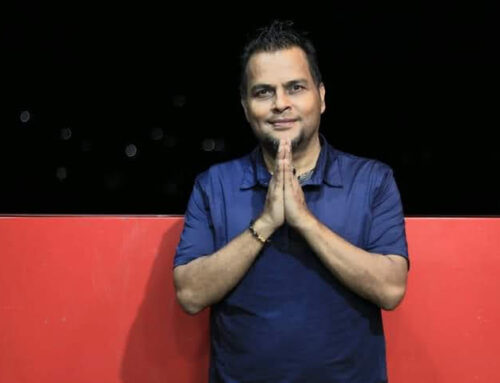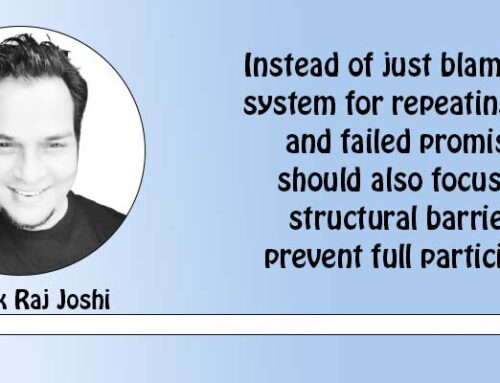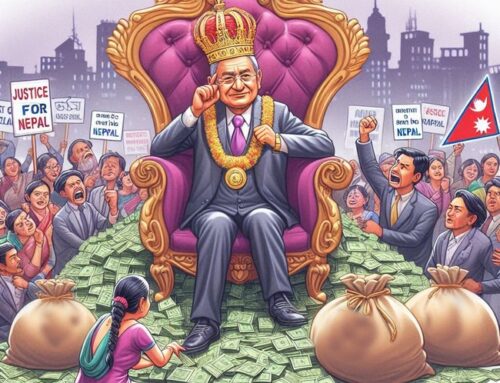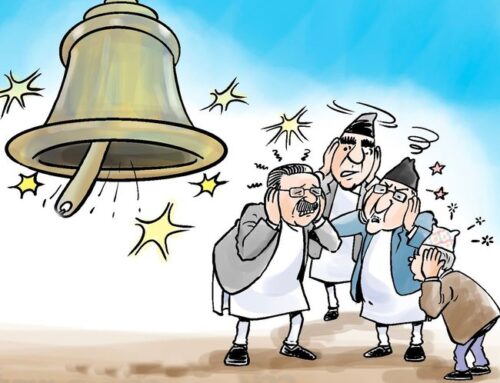Deepak Raj Joshi
Ghislaine Lanctôt once said: “The health system is a true mafia that creates diseases and kills for money and power”.
A controversial author of the world, Ghislaine practiced medicine for 27 years and withdrew herself from the medical field to publish the book called ‘Medical Mafia’ which is a bestseller.
Corruption
The health sector in Nepal is in a state of collapse. The common man has been plagued by rampant corruption, looting, and fraud. Few close political allies have an influence over powerful people in government in controlling and dominating the health sector for the last two decades. Numerous people who run private medical institutions have been posted in important departments of the government in the past and are still associated with the government in various channels.
Education is our basic right. Providing quality and affordable education to people becomes the basic duty of the state. The education sector is being run on a large scale along the lines of the market economy. Many of the private medical colleges seem to have been run by profit-seeking people. They are not health professionals.
The common man’s life is getting more and more difficult. When a poor man is ill, he holds a prescription from a doctor and when he enters the medical store, the ruthless wheel of the drug industry starts moving.
The medical mafia is a system that keeps the patient in ignorance and dependence, and he is encouraged to consume drugs of all kinds. Sad but true, the healthcare system is designed to keep people sick as long as possible and encourage them to buy drugs throughout their life.
The problems of health corruption represent a challenge in several areas that not only concern the bioethics of physicians and health institutions but also other stakeholders in the sector such as prepaid medicine companies, pharmaceutical companies, intermediaries or brokers, suppliers of medical equipment and supplies, among others.
In our country, access to public health services is one of the most worrying problems of the general population, lack of planning, and management of government health institutions. The health system is broken and it is not easy to fix. Corporate greed and systematic political failure have left the health system on its knees.
The elimination of health inequalities and the fight against all forms of discrimination in Nepal must remain a priority if the country is to achieve social cohesion. Medicine is an area that focuses on getting sick people treated. We are constantly hearing good news about how medicine has evolved by leaps and bounds, but more and more people are becoming ill with various diseases and viruses every year. More and more people die from different diseases annually.
The health system in the country has fallen into the clutches of a true mafia that creates diseases and kills people for money and power. The mafia is ready to profit from the coronavirus. It is sad to note that even the government’s mechanisms seem to be supporting such mafia one way or the other. All mafias have power, alliances, purchase of people, an extension of networks, and for this the family is important. Many politicians own private hospitals and they do not really care about public healthcare.
All we have is extortion, looting, and blackmailing. Our society worships those who pollute and corrupt, who evade taxes, who invent scandals and spy on the neighbor, who raise your bills and lower your wages, who speculate with the land, who buy from politicians and the media, and those who rule and ignore people like Dr. Govinda KC. Needless to say, Dr. KC has been fighting this battle with principles, conviction, and with integrity.
In Nepal, there are around 22,000 doctors who graduated from 23 medical colleges. These colleges can enroll around 2,350 medical students with an average fee of Rs. 4 million. Nepal had one doctor for every 1,500 people, as of December 2018. Dr. KC is the only person who has been fighting for reforming the healthcare system in the country.
Social justice
In line with the constitutional provision, health is a fundamental right of all citizens. The probability of getting sick, life expectancy, and the quality of life of people depend mainly on social and economic factors. Therefore, it can be said that health is a matter of social justice. The reformers are not radicals. They often demonize radicals. It is not wrong to fight for change within the status quo.
Dr. KC has dedicated his life to listening to the voices of all those who face discrimination, t who feel stigmatized, who find it difficult to receive the healthcare and the rights of people. He is a living symbol of the struggle for social justice. The unselfish personality deserves applauds for his unflinching commitment to ensuring equality and social justice.
(A telecommunication engineer by profession, Joshi is currently the managing director of New Millennium College. [email protected])




